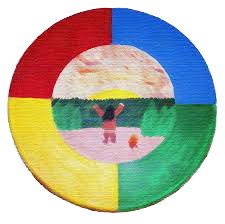Some Days
Artistic creation is always an act of faith. Whether you're working alone as I usually do, or involved in collective creation like at Stardale, all you can do each time out is hope for the best and take what you are given. As with anything else some days are better than others.
I'm a trained and experienced author. I have better days than others. In working with the Stardale girls, all I can do is give the best prompts I know how and hope I say something evocative that will spark some writing from them on that particular evening.
Some of them are as young as eleven years old. Over my time with the girls (new girls each year, some continuity, but none of the original girls I worked with are still in the group) we have covered some very difficult subjects - suicide, broken dreams, now murdered and missing indigenous women. What makes me expect that they will come up with the goods night after night? I would hardly expect such consistent performance from a university class, and these are just children after all.
There's something I tell them that I think makes a difference and causes them to take our work very seriously. I tell them when I was their age, no one took what young people had to say very seriously. I grew up in the era of the adage, "children should be seen but not heard." But now, in this age, they are being listened to.
Further, I tell them that as bad as it may have been for me, a boy, it was far worse for girls. No one took them or what they had to say very seriously at all, if they even listened in the first place. I tell them for all kinds of reasons and thanks to the energy and passion of many strong women (such as Helen, such as Wanda, our elder) more and more people actually want to hear what girls have to say.
And finally, I tell them when I was young, our indigenous people were essentially invisible. Think of it: they weren't even allowed to leave their Reserves until 1967. Everything was separate, everything was kept quiet.
Honestly, I had never even heard about the residential schools until a few years ago.
I was recently reading about the 75 anniversary of the liberation of the inmates at Auschwitz, and that the people even in the immediate vicinity had no idea what was going on there. I don't think it's too hard a comparison to make. Governments tend to keep quiet about their attempts at genocide.
So I tell the girls, for the first time in memory, people want to hear what young First Nations girls have to say. They don't know anything about what their experience is like, and if thing are ever going to change, now is the time to share their thought and feelings.
A few months ago, Helen and a few of the girls and I did a performance of our piece titled Committing for an older and extremely white audience. I looked around the room and thought, "Oh man. We are dead in the water here."
But then when we started to read, a curious thing happened. They leaned forward in their chairs. They took in every last word. They asked good questions at the end. They wanted to learn, and they did learn from the girls. It turned out to be one of the best shows we ever did.
And so, these young girls and I carry on, with them telling their stories, sharing their experiences, making their voices heard. Me, just trying to give some shape to their ideas and some form to their expression.
Some days, I can almost believe we are making a difference.

